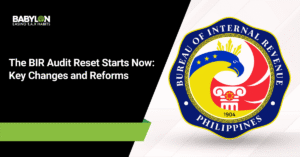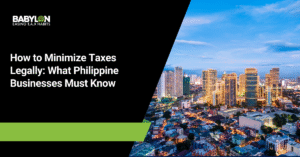When Do Enhanced Tax Incentives and Reforms Under the CREATE Act Apply?
The enhanced tax incentives and reforms introduced under the Corporate Recovery and Tax Incentives for Enterprises (CREATE) Act apply upon the effectivity of the law and its implementing rules and regulations (IRR). Specifically:
a. Reduced Corporate Income Tax Rate: The CREATE MORE Act introduces a 20% Corporate Income Tax (CIT) rate for Registered Business Enterprises (RBEs) under the Enhanced Deductions Regime (EDR), reducing overall tax liabilities while allowing companies to benefit from enhanced deductions on qualifying expenses.
b. Expanded Deductions: The Act increases the percentage of deductible expenses under the EDR, such as raising the additional deduction for power expenses to 100% from 50%. It also introduces new deductible items related to trade fairs and exhibitions and allows Net Operating Losses to be carried over for five years following the Income Tax Holiday (ITH) period.
c. Broadened Eligibility for Incentives: The CREATE MORE Act expands the scope of eligible businesses to include both foreign and local enterprises as “registered business enterprises,” promoting the Philippines as an attractive investment destination.
d. VAT Exemption and Zero-Rating: The Act clarifies VAT incentives, specifying that goods and services directly attributable to registered activities qualify for VAT exemptions or zero-rating, thus preventing abuse and ensuring benefits are aligned with core business operations.
e. Special Provisions for High-Value Domestic Market Enterprises (HVDME): DMEs with significant investment capital or export sales will enjoy enhanced 0% VAT on local purchases and VAT exemption on importation, attracting major investments in critical sectors like infrastructure and manufacturing.
f. Local Tax Simplification: Eligible companies, including those enjoying ITH or EDR, are subject to a local tax of up to 2% of gross income, replacing all other local taxes and fees, thereby reducing administrative burdens and allowing businesses to focus on operations.
To further explore these exciting enhancements on tax incentive system, the CREATE MORE Act was introduced. On November 11, 2024, President Ferdinand Marcos, Jr. signed into law Republic Act (R.A.) 12066, also known as the CREATE MORE act. The law takes effect on November 28, 2024, fifteen (15) days after its publication in the Official Gazette.
CREATE MORE, an acronym for Corporate Recovery and Tax Incentives for Enterprises to Maximize Opportunities for Reinvigorating the Economy, is designed to enhance the Philippines’ global competitiveness. By offering improved tax benefits and streamlined processes, the Act aims to attract more investors and stimulate economic growth.
The salient features of the law which seek to optimize tax incentives and simplify tax measures for businesses are as follows:
A. Lowered Income Tax Rate and Additional/Improved Deductions for Registered Business Enterprises (RBE) under the Enhanced Deduction Regime (EDR)
Under CREATE MORE, RBEs which were previously taxed under the CREATE ACT at 25%, shall now be taxed at 20% on their income derived from registered projects or activities. Moreover, the following additional and improved incentives are presented to further entice investments:

B. Tax Regimes Available for Registered Export Enterprises (REE) and Registered Domestic Market Enterprises (DMEs)
REEs can choose from the following tax regimes:
1. Income Tax Holiday (ITH) followed by either:
o Special Corporate Income Tax (SCIT)
o Enhanced Deductions Regime (EDR)
2. SCIT as a substitute for all national and local taxes, including fees and charges.
3. Enhanced Deductions Regime (EDR) exclusively.
Meanwhile, DMEs have the following options:
1. Income Tax Holiday (ITH) followed by the Enhanced Deductions Regime (EDR).
2. Enhanced Deductions Regime (EDR) alone.
The duration of incentives available to REEs and DMEs will depend on the governing body responsible for granting them. Investment Promotion Agencies (IPAs) are authorized to provide incentives for investments with a capital of PHP 15 billion or less, while the Fiscal Incentives Review Board (FIRB) is responsible for granting incentives to investments exceeding the PHP 15 billion threshold.
The period of availment is summarized as follows:

Under Option 2 (No ITH), the incentives period of the REEs (SCIT/EDR) and DMEs (EDR only) will depend upon the location and industry tier of the registered project.

C. RBE Local Tax (RBELT)
CREATE MORE gives local government units (LGUs) the power to impose taxes of up to 2% of the gross income earned by RBEs, in lieu of all local taxes, fees, and charges during the ITH and EDR. However, the RBELT does not apply to RBEs availing of the SCIT, as SCIT already replaces all national and local taxes, including local fees and charges.
D. Duty and VAT Exemption on Importations and VAT zero-rating on local purchases
R.A. 12066 expands the scope of importations eligible for Duty and VAT exemptions, as well as local purchases that qualify for VAT zero-rating:

E. Amendments to VAT Exemption and Zero-rating provisions
During the early implementation of the CREATE Act, challenges emerged regarding VAT incentives, as these applied only to goods and services sold to RBEs that were directly and exclusively used in their registered activities. CREATE MORE addressed these concerns by clarifying the provisions. The key amendments are summarized as follows:

F. Availment of Incentives
RBEs enjoying incentives prior to the implementation of CREATE are permitted to continue availing these benefits until December 31, 2034.

On the other hand, incentives under CREATE MORE shall have prospective application.
G. Other Benefits
g. 1. Exempt Donations
Donations made to the government, its agencies, political subdivisions, government-owned and controlled corporations (GOCCs), or TESDA are exempt from import duties and taxes (including donor’s tax).
g. 2. Income Tax Exemption for Agreements entered into by the President
Agreements made by the President with economies and administrative regions are exempt from income tax, provided the Senate approves.
g. 3. Reimplementation of the 15% Creditable Withholding Tax Rate
Income paid to individuals or entities in the Philippines may be subject to a creditable withholding tax (CWT) of up to 15%. Prior to CREATE MORE, the CWT rate is at 1% to 32%.
g. 4. Excise Tax Exemption
Petroleum products sold to international carriers that directly import these products for consumption outside the Philippines are exempt from excise tax.
g. 5. Excise Tax Refund Claim
Suppliers of petroleum products can claim a refund for excise tax paid if they can provide proof that:
· The products were sold to international carriers or entities under foreign registry.
· The products were intended for use or consumption outside the Philippines.
· The process outlined in Section 135-A of the Tax Code was followed.
H. Flexible Work Arrangements for RBE Employees
CREATE MORE provided an exception to the rule imposed under CREATE, which required an IPA administering an economic zone or freeport zone to conduct its registered activity exclusively within the geographical boundaries of the subject zone or freeport. Now, RBEs are permitted to implement telecommuting programs, as outlined in R.A. No. 11165, including work-from-home setups. However, these arrangements must not exceed 50% of the total workforce and must comply with the rules and regulations set by the IPA. To avoid abuse, double registration to claim additional incentives under special laws is not allowed.
I. Tax Refunds
h.1. Refunds or Tax Credits of Input Tax
Under the CREATE Act, the Commissioner of Internal Revenue (CIR) is given 90 days from submitting complete documents to either approve or deny a taxpayer’s request for a refund.
The CREATE MORE Act introduces a new provision allowing taxpayers to file a request for reconsideration within 15 days of receiving a full or partial denial of their refund request. The CIR is then required to decide on the reconsideration within 15 days.
The 30-day period to appeal to the Court of Tax Appeals (CTA) begins from:
1. The receipt of the denial of the request for reconsideration; or
2. In case of CIR inaction:
o After the 90-day period to act on the original refund request; or
o After the 15-day period to decide on the request for reconsideration.
h.2. Refunds or Excise Tax
The CREATE MORE Act has reduced the processing period for the Commissioner of Internal Revenue (CIR) to decide on excise tax refund applications from 180 days to 90 days. If the CIR denies the application or fails to act within the 90-day period, the taxpayer may file a request for reconsideration within 15 days of the denial or inaction. The preceding timelines outlined for input tax refunds also apply to excise tax refunds.
J. Penalties for Government Officials for Non-Action on Refund Applications
The deliberate failure of the Bureau to act on refund applications within the prescribed periods—90 days for refund requests and 15 days for requests for reconsideration—under Section 112 (Refunds or Tax Credits of Input Tax), Section 135-A (Refund of Excise Tax on Petroleum Products), and Section 204 (Authority of the Commissioner to Compromise, Abate, and Refund or Credit Taxes) of the Tax Code will result in the following penalties for non-compliance:
· A fine ranging from PHP 50,000 to PHP 100,000
· Imprisonment of 10 to 15 years
· Perpetual disqualification from holding public office, voting, or participating in any public election.
K. Electronic Receipts and Electronic Reporting System
Taxpayers can choose to issue electronic invoices and/or electronically report their sales data to the BIR. The Secretary of Finance, based on recommendations from the CIR, may mandate this practice.
Taxpayers who issue electronic invoices and electronically report their sales to the BIR may claim the following additional deductions based on total setup cost of the electronic system:
· 100% deduction for micro and small taxpayers.
· 50% deduction for medium and large taxpayers.
The additional deductions can only be claimed once. Importation of electronic sales reporting systems shall be tax-exempt.
L. Establishment of A One-Stop Action Center and Initial Point of Contact for Foreign Investment Leads
To further encourage ease of doing business in the Philippines, CREATE MORE empowers IPAs to have one-stop shops for the licensing, permits, and other compliance needs of registered activities.
M. Incentives Granting Body
Under CREATE MORE, the functions of the IPA and FIRB have been expanded to include the following:

N. Transitory Provisions
· The Department of Finance, based on recommendations from the BIR, must issue the necessary rules and regulations within 90 days of the law’s effectivity, specifically by 26 February 2025.
· The provisions of CREATE MORE will automatically take effect 15 days after its publication in the Official Gazette or a newspaper of general circulation, beginning on 28 November 2024.
This law builds upon the foundation of the CREATE Act by further enhancing the Philippines’ tax incentive framework, aiming to attract more foreign investment and stimulate economic growth. By lowering tax rates, improving deductions, and simplifying compliance processes, the Act positions the Philippines as a competitive destination for business operations. Enterprises can benefit from a range of incentives tailored to their specific needs, fostering an environment conducive to economic recovery and development.
Let us Guide you Through these Changes!
Babylon2k helps your business handle the complications of VAT reporting, tax filing, and adapting to new regulations. Utilizing our expertise in accounting and tax ensures that your business remains compliant while minimizing disruption to your operations.
Whether you’re a small business, a growing startup, or a company reliant on digital platforms, Babylon2k provides tailored solutions to meet your business’s needs. Each service is designed to simplify the tax process for you. Each service has a corresponding code (e.g., 110010, 110040), and the some of our services under tax are:
- AA0040 – REVIEW OF TAX ACCOUNTS + FILING (BIR) W/ BOOKKEEPING
- GG0140 – TAX COMPLIANCE REVIEW
- GG0150 – TAX ADVISORY SERVICES
Additionally, B.E.T.H. can help you when you need more information and clarification on how this law affects your business.
Let us guide you through these changes! When you’re ready to start, simply sign in or request a quote and enter the relevant service code(s) to ensure we can connect you with the perfect Babylon2k specialist.
- Request a free consultation
- Message us on Viber/Whatsapp Number @ +63-927-945-3382.
- Email us directly at [email protected]






